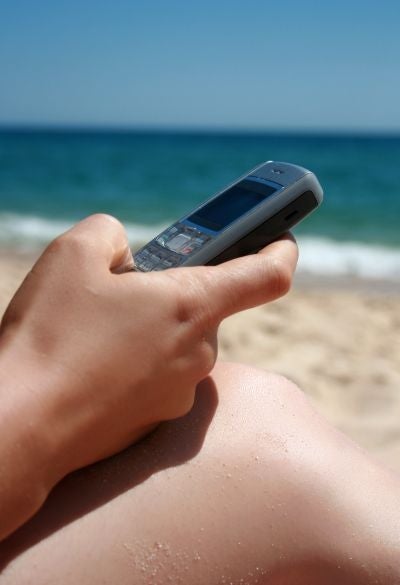What if your smartphone could tell if you are sick before you had a scratch in your throat or screen for malaria? What if your social network could prevent an epidemic? Webcam spot an illness in your retinas? It's all in the works, and networked health surveillance tools and intelligent diagnostics are the future.
Advanced technologies to detect viral infections
Defense Advanced Research Projects Agency (DARPA), the research arm of the US Department of Defense (DOD), tapped researchers at the Duke Institute for Genome Sciences and Policy in September 2009 "to design a portable, easy-to-use diagnostic device that can reveal who is infected with an upper respiratory virus before the first cough or sneeze."
DARPA contributed $19.5 million to the effort that according to the tech magazine Wired on May 13, has come a long way fast. The researchers led by Geoffrey S. Ginsburg, MD, PhD, founding director of the Center for Genomic Medicine at the Duke Institute for Genome Sciences and Policy, are now screening 80 healthy people in four different studies where they "were exposed to three different viral strains. Their blood, saliva and urine were then tested for ‘viral specific signatures,' that would characterize illness."
Provided this works, the DOD will be able to manage an illness 24 hours before a soldier feels the onset and the benefits should lead to new diagnostic options for the public too. Ginsberg cautions it's a few years away but it will eliminate the overuse of antibiotics.
He added, "Imagine a sensor attached to your telephone, that instantly diagnoses viral agents and transmits that to a central community database." He noted that "Google used searches to beat the CDC at tracking H1N1 - this would be surveillance that could take that to the next level." http://www.genome.duke.edu/people/faculty/ginsburg/
Webcam and software for eye test
In the future it may be possible to simply check your eyes with a webcam that will screen to see if your retinas show any signs of vision-related illness. For now, researchers at the new start-up Automated Medical Diagnostics (AMDx) fueled by the co-founders from Oak Ridge National Laboratory (ORNL) and the University of Tennessee Health Science Center, Edward Chaum, an ophthalmologist and a scientist, and Ken Tobin, systems engineer, are developing the technology to detect "diabetic retinopathy," disease that can cause blindness, in advance of any vision problems or blurriness, announced ORNL on May 5.
The vision screening will work by taking "pictures of the retina" with "web-based technology [that] uses a digital camera" under the supervision of a health professional. The retinal image is then "processed through the patented system that quickly sorts through large databases and finds visually similar images representing equivalent states of diabetic eye disease" ensuring rapid results. http://www.ornl.gov/info/press_releases/get_press_release.cfm?ReleaseNumber=mr20100505-00
Social networking may catch outbreaks early
Nicholas A. Christakis, MD, PhD, MPH, an internist, social scientist and professor of medical sociology, medicine, and sociology at Harvard University, and James H. Fowler, a political scientist specializing in social networks and professor of political science at the University of California, San Diego, collaborated on a research project that analyzed "friends" to determine flu outbreaks (both seasonal and swine) at Harvard in 2009.
The researchers monitored 744 Harvard students by identifying random individuals and selecting their three most popular friends and those "most central" in order to analyze the spread of the flu. The novel approach showed promising evidence that social networks could be a valuable tool for keeping communities healthy and preventing large outbreaks.
The study, according to the May 14 print edition of The Economist, a global current events magazine, has been submitted to Proceedings of the National Academy of Sciences for publication . It is currently available for download via arVix.org, a research online database linked to Cornell University Library. http://arxiv.org/abs/1004.4792
Smartphone for malaria screening
Aydogan Ozcan, PhD, electrical engineer and assistant professor at the University of California, Los Angeles, was awarded with a $100,000 (€78,880) grant for an innovative global health solution: cell phone microscope to diagnose malaria by the Grand Challenges Explorations, a five-year $100 million (€78 million) initiative to promote innovation in global health funded by the Gates Foundation, on May 10.
If Ozcan is successful, he will be able to make smarter phones with diagnostic capabilities. Screening for malaria is costly and time-consuming for much of the world that suffers the greatest from it.
Do you have an actionable idea for a "health in the future" solution? It may be possible to squeeze an application in for the next (fifth) round of Grand Challenges Explorations that closes on May 19 (grantees to be announced in October). The topics trend towards intelligent diagnostics, including:
- Low-Cost Cell Phone-Based Applications for Priority Global Health Conditions
- New Technologies to Improve the Health of Mothers and Newborns
To apply and learn more about the Grand Challenges Explorations, go to: http://www.grandchallenges.org
Subscribe to Independent Premium to bookmark this article
Want to bookmark your favourite articles and stories to read or reference later? Start your Independent Premium subscription today.


Join our commenting forum
Join thought-provoking conversations, follow other Independent readers and see their replies